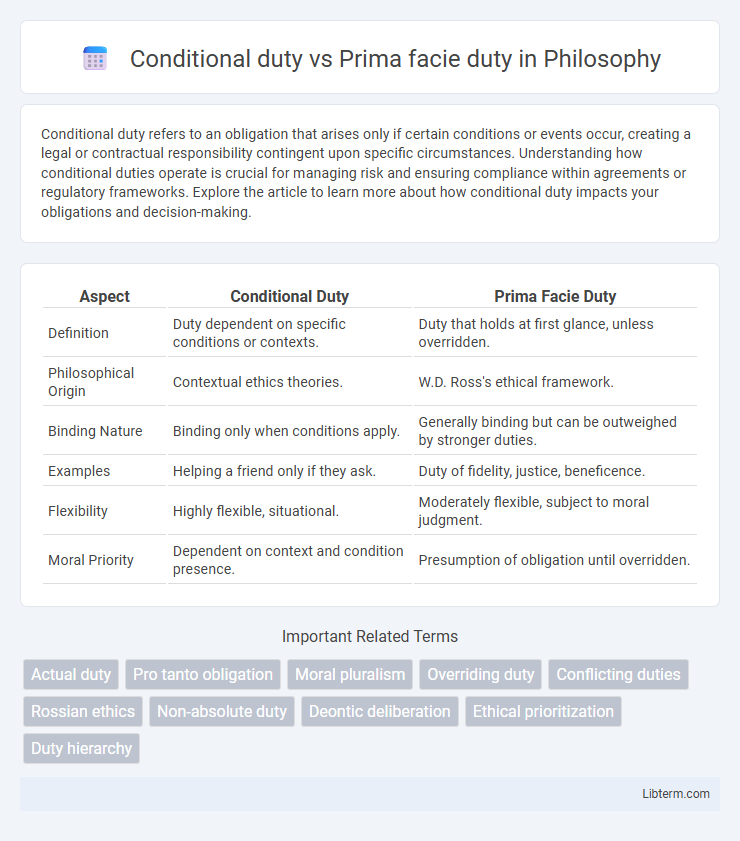Conditional duty refers to an obligation that arises only if certain conditions or events occur, creating a legal or contractual responsibility contingent upon specific circumstances. Understanding how conditional duties operate is crucial for managing risk and ensuring compliance within agreements or regulatory frameworks. Explore the article to learn more about how conditional duty impacts your obligations and decision-making.
Table of Comparison
| Aspect | Conditional Duty | Prima Facie Duty |
|---|---|---|
| Definition | Duty dependent on specific conditions or contexts. | Duty that holds at first glance, unless overridden. |
| Philosophical Origin | Contextual ethics theories. | W.D. Ross's ethical framework. |
| Binding Nature | Binding only when conditions apply. | Generally binding but can be outweighed by stronger duties. |
| Examples | Helping a friend only if they ask. | Duty of fidelity, justice, beneficence. |
| Flexibility | Highly flexible, situational. | Moderately flexible, subject to moral judgment. |
| Moral Priority | Dependent on context and condition presence. | Presumption of obligation until overridden. |
Understanding Conditional Duty: Definition and Examples
Conditional duty refers to obligations that arise only under specific circumstances or conditions, making them dependent on particular situations. For example, a doctor has a conditional duty to provide emergency care if a patient is in immediate danger, but not otherwise. Understanding conditional duty is crucial for distinguishing when a moral or legal responsibility applies based on contextual factors.
Prima Facie Duty Explained: Meaning and Origins
Prima facie duty refers to an ethical obligation that is binding unless overridden by a more pressing duty in a specific context, rooted in the philosophy of W.D. Ross. This concept emphasizes that moral duties are not absolute but rather conditional, requiring consideration of circumstances to determine which duty takes precedence. Understanding prima facie duties involves recognizing their flexibility and origin in moral intuitionism, which contrasts with rigid conditional duties dependent solely on external conditions.
Key Differences: Conditional Duty vs Prima Facie Duty
Conditional duty applies only under specific circumstances or conditions, meaning it becomes binding when particular criteria are met. Prima facie duty represents a general moral obligation that holds unless overridden by a stronger conflicting duty, serving as an initial ethical guideline. Key differences include conditional duty's reliance on situational triggers, whereas prima facie duty functions as a default ethical principle subject to re-evaluation based on context.
Historical Background and Philosophical Roots
Conditional duty and prima facie duty stem from distinct philosophical traditions that explore moral obligations. Prima facie duty, introduced by W.D. Ross in the early 20th century, emphasizes inherent moral principles that remain binding unless overridden by a more pressing duty. Conditional duty, influenced by utilitarian and consequentialist thought, depends on specific situational contexts, suggesting obligations arise only under certain conditions or outcomes.
Application in Ethical Decision-Making
Conditional duty requires actions based on specific situations or relationships, making it flexible in ethical decision-making by adapting to contextual factors. Prima facie duty, defined by W.D. Ross, involves inherent moral obligations that hold unless overridden by more pressing duties, guiding consistent ethical evaluation. Together, they offer a balanced framework for assessing moral responsibilities amid competing ethical claims.
Strengths and Limitations of Conditional Duty
Conditional duty provides a flexible ethical framework that adapts to specific situations, enhancing its practical application in complex moral contexts. Its strength lies in prioritizing duties based on conditions, allowing for context-sensitive decision-making and reducing rigid moral conflicts. However, it may lead to ambiguity or inconsistency when determining which conditions apply, potentially undermining moral clarity and accountability.
Evaluating the Flexibility of Prima Facie Duties
Prima facie duties, as proposed by W.D. Ross, serve as morally binding obligations that hold unless overridden by a more pressing duty, highlighting their inherent flexibility in ethical decision-making. Unlike conditional duties, which depend strictly on specific situations or agreements, prima facie duties provide a framework for balancing multiple ethical obligations when conflicts arise. Evaluating the flexibility of prima facie duties involves assessing their capacity to adapt to complex moral contexts while maintaining a coherent guide for action.
Practical Scenarios: Comparative Case Studies
In practical scenarios, conditional duty applies when specific circumstances trigger a moral obligation, such as a doctor's duty to treat a patient in emergency conditions, whereas prima facie duty serves as a general ethical guideline that holds unless overridden by a stronger duty, like telling the truth unless it causes significant harm. Comparative case studies reveal how conditional duties often depend on context, such as contractual agreements mandating action only if certain events occur, while prima facie duties consistently require moral consideration regardless of outcomes. This distinction reflects the complexities in ethical decision-making, where conditional duties adapt to situational nuances, and prima facie duties provide a foundational framework for evaluating competing moral claims.
Critiques and Contemporary Debates
Critiques of conditional duty argue it relies too heavily on specific circumstances, potentially undermining universal moral obligations, while prima facie duty faces challenges for its perceived rigidity and difficulty in resolving conflicts between duties. Contemporary debates explore the balance between contextual ethical flexibility and the need for clear, actionable moral guidelines, highlighting tensions in applying these theories across diverse cultural and practical scenarios. Scholars increasingly question how both concepts can adapt to pluralistic societies without sacrificing normative clarity or moral accountability.
Implications for Modern Ethical Frameworks
Conditional duty arises when obligations depend on specific circumstances or relationships, influencing ethical decision-making by allowing greater contextual flexibility. Prima facie duty represents universal moral principles that hold unless overridden by stronger duties, providing a baseline for evaluating competing ethical claims in diverse scenarios. Modern ethical frameworks incorporate these concepts to balance absolute rules with situational nuances, promoting adaptive yet principled moral judgments.
Conditional duty Infographic

 libterm.com
libterm.com